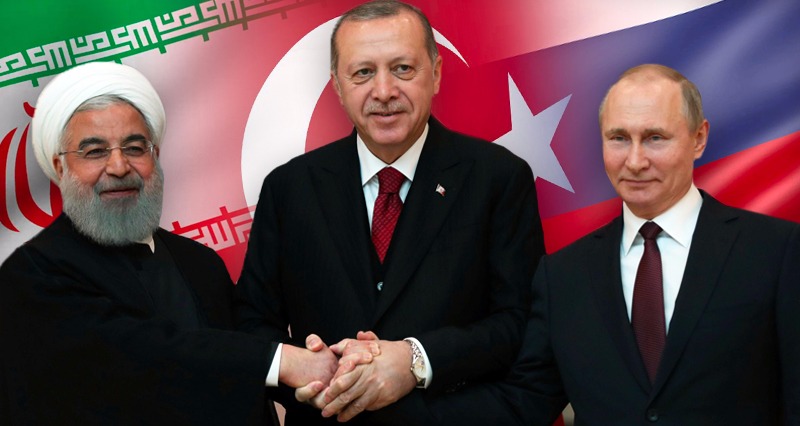Vladimir Putin and Recep Tayyip Erdogan, for the third time in the last 9 months, met during a summit, this time hosted by Hassan Rouhani on September 7 in Tehran. The Tehran Summit took place after two summits held in Sochi and Ankara aimed at providing conditions for the implementation of a ceasefire agreement and the transition of the Syrian crisis from the military phase into a political phase.The main objectives of the Astana agreement were to reduce the tension between the Syrian government and the opposition in four key regions: Idlib, eastern Ghouta, Homs and southern Syria.
These tripartite meetings will include the presidents of Russia, Turkey and Iran, and will take place on the condition that most of the above regions in Syria are cleared of terrorists. As of now, the IdlibGovernorate is the most important area under terrorist occupation, but clearing operations are set to begin soon.However,even if we exclude the issue of Idlib, we find that there is little hope of the Syrian crisis entering into a political phase. There are three key aspects leaving the country prone to the large scale military conflicts:
-
In northern Syria, and specifically east of the Euphrates River and the Afrin district, there are long term conflicts between Kurdish YPG forces and Turkish-backed forces.
-
In eastern Syria, in western regions of the Euphrates River and the eastern parts of the Deir-ez-Zor Governorate, fighting continues between the Syrian Democratic Forces, known as the SDF, and the Iranian- and Russian-backed forces.
-
In the south of Syria and Al-Tanf area, there are battles raging between US forces and the Syrian army.
The above issues were evident in each of the three presidents speeches, and by the end of the Tehran summit it had become clear that there was virtually no specific plan for reaching the objectives of the Astana agreement.Given the close proximity of the three countries, who ends up on which side of the battle for Idlib will be a decisive factor in reaching a unified decision on the future of peace in Syria.There was strong disagreement between Erdogan and Putin on whether or not to add a paragraph to the ceasefire agreement in the final statement of the summit. This disagreement is an indication of the inconsistencies between the participants, and the fundamental difference in their views of the Syrian crisis.Turkey clearly opposes any military operations to clear Idlib because the Free Syrian Army forces there operate with Ankara’s support, forces such as theTahrir al-Sham terrorist organization. This connection has until now sheltered the group in the IdlibGovernorate; any military operation could lead to the complete withdrawal of Turkish-backed forces from the area.Perhaps the only point of agreement between the three leaders was their emphasis on the necessity of US troop withdrawal from Syria, and the illegality of their presence in Syria.
The other central topic of the Tehran summit was economic relations between the participants.At present, all three countries are subject to US economic sanctions, and given Washington’s trade wars with all three countries, they have naturally begun gravitating toward bilateral or trilateral cooperation in the economic field.
Due to fluctuations in the energy market, Turkey has been pursuing economic rehabilitation policies over the past year, and, given the economic conflict with the United States, the country feels a strong need to adapt its economic policy. Russia and Iran, as Turkey’s neighbors and partners, can help Ankara in this endeavor. Turkey is also seeking to create new sources of financial revenue in order to resist future US sanctions.Iran intends to reduce US sanctions through cooperation with Russia and Turkey, as well as through its membership in the Eurasian Economic Union.Tehran considers Moscow to be its largest economic partner while under sanctions, whereas Ankara is seen as a gateway to European markets. If not accompanied by the two neighbors, Iran’s energy exports to Europe will be disrupted,in which case Turkey will likewise suffer a lack of energy imports. This is one of the primary reasons for the formation of bilateral relations between Tehran and Ankara.
At the same time, Russia is vigorously pursuing a policy of eliminating the dollar and transitioning to operating with national currencies in bilateral economic exchanges with other countries; especially with Iran and Turkey. The development of banking relationships and brokerage relations is a necessary prerequisite for such developments.
A large part of these economic goals will be met by adhering to the “monetary treaty”.
Countries use intermediary currencies in order to ease economic relations, on most occasions, the most stable currency to use for this purpose is the American dollar.Now, imagine that Iran and Turkey want to eliminate the dollar from such deals… in this situation, if Iran exports 20 units of a good to Turkey and imports 30, 20 of those units could be traded in the national currency of the two countries, while the other 10 would require an intermediary currency.In this case, if a third country acts as a participant in the monetary agreement, the remaining 10 goods could be traded in the currency of that country. The Tehran summit has added Moscow to trade processes between Iran and Turkey, a move that improves Moscow, Ankara and Tehran’s ability to eliminate the dollar.
In closing, it should be noted that the efforts of the United States and its allies to isolate Russia, Iran and Turkey are ongoing. In this regard, the Tehran summit presents a pattern of strategic coping with US plans, in which countries (despite their issues) can, with realism and goodwill, agree to multi-faceted win-win relations with one another.Generally speaking, while the Tehran summit failed to provide a practical solution to the Syrian crisis, it was very useful step in economic negotiations between the three countries, especially against the dominance of the dollar.

















Leave a Reply